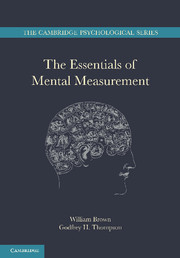Book contents
- Frontmatter
- PREFACE
- Contents
- ERRATA
- PART I PSYCHOPHYSICS
- PART II CORRELATION
- CHAPTER V INTRODUCTION TO CORRELATION
- CHAPTER VI THE MATHEMATICAL THEORY OF CORRELATION
- CHAPTER VII THE INFLUENCE OF SELECTION
- CHAPTER VIII THE CORRECTION OF RAW CORRELATION COEFFICIENTS
- CHAPTER IX THE THEORY OF GENERAL ABILITY
- CHAPTER X A SAMPLING THEORY OF ABILITY
- CHAPTER XI THE PRESENT POSITION (1924)
- CHAPTER XII THE MATHEMATICAL AND EXPERIMENTAL EVIDENCE FOR THE EXISTENCE OF A CENTRAL INTELLECTIVE FACTOR (g)
- CHAPTER XIII A TEST OF THE THEORY OF TWO FACTORS
- CHAPTER XIV RECENT DEVELOPMENTS OF STATISTICAL METHOD IN PSYCHOLOGY
- CHAPTER XV THE FACTORIAL ANALYSIS OF ABILITY
- APPENDIX I TABLES
- APPENDIX II A LIST OF DEFINITE INTEGRALS OF FREQUENT OCCURRENCE IN PROBABILITY WORK
- INDEX
CHAPTER VIII - THE CORRECTION OF RAW CORRELATION COEFFICIENTS
from PART II - CORRELATION
Published online by Cambridge University Press: 05 June 2016
- Frontmatter
- PREFACE
- Contents
- ERRATA
- PART I PSYCHOPHYSICS
- PART II CORRELATION
- CHAPTER V INTRODUCTION TO CORRELATION
- CHAPTER VI THE MATHEMATICAL THEORY OF CORRELATION
- CHAPTER VII THE INFLUENCE OF SELECTION
- CHAPTER VIII THE CORRECTION OF RAW CORRELATION COEFFICIENTS
- CHAPTER IX THE THEORY OF GENERAL ABILITY
- CHAPTER X A SAMPLING THEORY OF ABILITY
- CHAPTER XI THE PRESENT POSITION (1924)
- CHAPTER XII THE MATHEMATICAL AND EXPERIMENTAL EVIDENCE FOR THE EXISTENCE OF A CENTRAL INTELLECTIVE FACTOR (g)
- CHAPTER XIII A TEST OF THE THEORY OF TWO FACTORS
- CHAPTER XIV RECENT DEVELOPMENTS OF STATISTICAL METHOD IN PSYCHOLOGY
- CHAPTER XV THE FACTORIAL ANALYSIS OF ABILITY
- APPENDIX I TABLES
- APPENDIX II A LIST OF DEFINITE INTEGRALS OF FREQUENT OCCURRENCE IN PROBABILITY WORK
- INDEX
Summary
Historical account—The elimination of irrelevant factors—Correction for observational errors (attenuation)—Correlation of gains and initial values.
HISTORICAL ACCOUNT
THE history of the use of the theory of correlation in Psychology can hardly be said to have begun earlier than the commencement of the present century. During the previous twenty years, indeed, a great deal of work had been done by many observers in measuring simple mental abilities (by the “mental test” method) in larger or smaller groups of subjects, and attempts had even been made to determine in what way these abilities were related to one another and to more general mental ability, or “general intelligence.”
Owing, however, to a universal lack of knowledge of the mathematical theory of correlation among psychologists during this period, the results were not obtained in a form suitable for comparison with one another, so that it is not surprising to find that they hopelessly contradict one another. The heterogeneity of the material worked with, the non-elimination of irrelevant factors, and the absence of any measure of the “probable error” of the results make the conclusions drawn by the investigators themselves from their researches utterly unreliable.
The first investigation showing any mathematical precision was that published by Clark Wissler in 1901. It contained (inter alia) an account of the careful application of a large number of simple mental tests upon over 200 college students, and a correlation of the results with one another and with the students' marks in the various subjects of the college curriculum. The mental tests were found to correlate but slightly with one another or with ability in college subjects of study, though these latter showed considerable correlation with one another (•30—•75).
In the following year Aikens and Thorndikef published results which were in a sense confirmatory of those of Wissler, since, notwithstanding the greater similarity to one another of the functions investigated than in Wissler's research, the correlations were again found to be low. For example, different tests devised for the measurement of “speed of association” were found to show hardly any correlation—a result which seemed to furnish some justification for the author's statement that “quickness of association as an ability determining the speed of all one's associations is a myth” (op. cit. p. 375).
- Type
- Chapter
- Information
- The Essentials of Mental Measurement , pp. 153 - 163Publisher: Cambridge University PressPrint publication year: 2013



